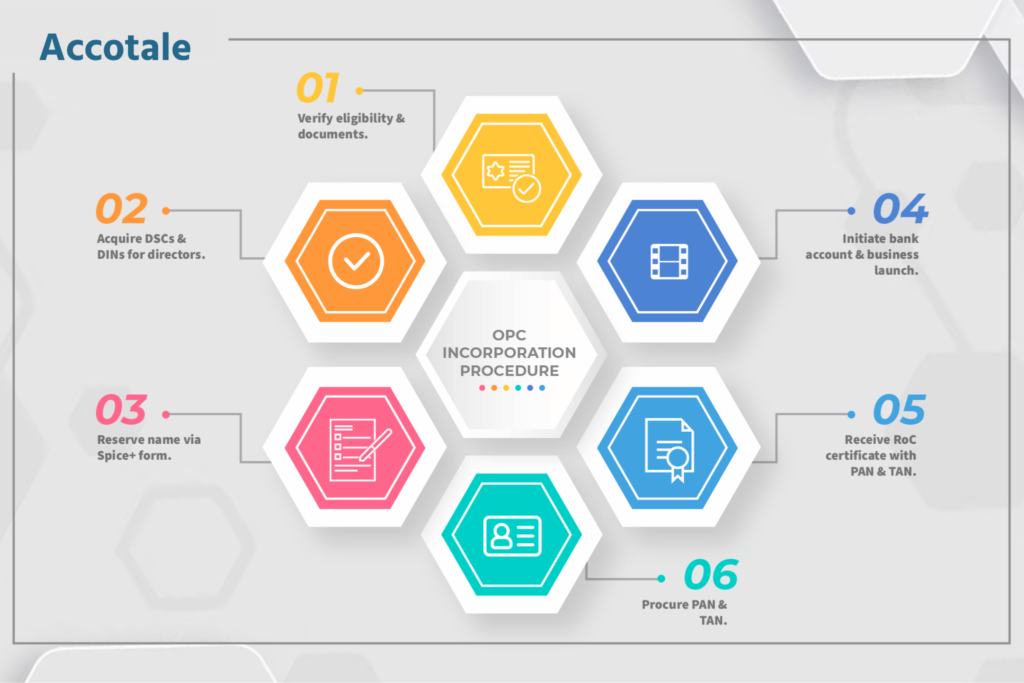One Person Company (OPC) Registration
- Fully expert-assisted company registration process
- Start your One Person Company Registration at just ₹999 + Govt Fee
A One Person Company (OPC) is a revolutionary business structure that allows a single individual to own and operate a company with the benefits of limited liability. It combines the advantages of sole proprietorship with the legal structure of a private limited company, making it an ideal option for solo entrepreneurs who want to run their business without partners but enjoy the protections that a company provides.


Our Services
All Inclusive Service-Inclusive of Government Fees
- PAN Registration
- TAN Registration
- Includes ESI & PF Registration
- Inclusive of GST Registration
- Free 6 month of TDS Return Filing
- Also includes Share Certificate
- Free Consultancy from Chartered Accountatnt for 6 months
Documents Required for OPC Registration
Identity and Address Proof
- Scanned copy of PAN card or passport (foreign nationals & NRIs)
- Scanned copy of voter ID/passport/driving
- Scanned copy of the latest bank statement/telephone or mobile bill/electricity or gas bill
- Scanned passport-sized photograph specimen signature (blank document with signature [directors only)
Registered Office Proof
- Scanned copy of the latest bank statement/telephone or mobile bill/electricity or gas bill
- Scanned copy of notarised rental agreement in English
- Scanned copy of no-objection certificate from the property owner
- Scanned copy of sale deed/property deed in English (in case of owned property)
One Person Company
A One Person Company (OPC) is a type of company in India that allows a single individual to own and operate a business as a separate legal entity. It combines the benefits of a sole proprietorship with the structure of a private limited company, giving the owner limited liability and a formal legal structure. OPC is ideal for small businesses, entrepreneurs, and solo business owners who want to establish a business entity while retaining full control.
It is lawful for OPC to be officially registered in India in accordance with Section 262 of the Companies Act of 2013. In India, registering a one-person corporation necessitates having a single director and one member who represents the entire company. Compared to a private corporation, this form of corporation has comparatively less compliance responsibilities.
At ACCOTALE, we provide expert assistance in registering your One Person Company, ensuring all legal formalities are handled smoothly and efficiently.

Advantages of One Person Company (OPC) in India
Limited Liability Protection:
The primary benefit of an OPC is that the owner’s liability is limited to the amount of their investment in the business. Personal assets are safeguarded against the company’s debts or legal actions.
Separate Legal Entity:
An OPC is treated as a separate legal entity, distinct from its owner. This gives it the ability to enter contracts, own property, and sue or be sued in its own name, similar to other forms of incorporated entities.
Complete Control:
As a single shareholder and director, the owner has complete control over decision-making in the company. This makes running the business efficient, allowing for quick decisions without the need for consultation with others.
Ease of Compliance:
OPCs have fewer compliance requirements compared to private limited companies, making it simpler for solo entrepreneurs to manage legal and regulatory obligations. Annual filings, board meetings, and audits are relatively straightforward.
Continued Existence:
OPCs benefit from perpetual succession. In the event of the owner’s death or incapacitation, the nominated person takes over, ensuring that the business can continue without disruption.
No Minimum Capital Requirement:
There is no minimum capital required to start an OPC, providing flexibility for small businesses and startups. The capital can be increased gradually as the business grows.
Tax Flexibility and Benefits:
An OPC is taxed as a private limited company, which often results in lower tax rates compared to sole proprietorships. OPCs are also eligible for various deductions and exemptions under Indian tax laws, such as lower corporate tax rates.
Improved Credibility and Trust:
An OPC, being a registered corporate entity, enjoys higher credibility in the market compared to sole proprietorships. This can help attract clients, vendors, and investors who may prefer dealing with a structured and recognized company.
Easy Access to Funding:
OPCs have better access to loans and funding compared to sole proprietorships, as financial institutions and investors view them as more structured, reliable, and compliant business entities.
Limited Regulatory Compliance:
Unlike private or public limited companies, OPCs have less stringent regulatory compliance. For example, they do not need to hold annual general meetings (AGMs) or adhere to complex board meeting rules, reducing administrative burdens.

Checklist for Individual Business Registration
- Maximum and minimum membership requirements must be met.
- There should be a nominee chosen before incorporation.
- Use Form INC-3 to request the nominee’s approval.
- The Companies (Incorporation Rules) 2014 mandate that the OPC name be selected.
- Minimum authorised capital of ₹1 Lakh.
- DSC of the potential director.
- Evidence of the OPC’s registered office.
Rules of Compliance for a One-Man Business
The Companies Act of 2013 outlines specific compliances that need to be fulfilled within the deadlines given. The ROC, shareholders, directors, investors, and tax authorities are among the parties whose interests are protected by these standards, which also promote transparency and sound governance. These requirements can be broken down into four categories: annual, recurrent, post-incorporation one-time, and event-dependent. This article goes into great detail about the first category of one-time compliances.
One Time Compliance
A sole proprietorship is required to adhere to the Companies Act of 2013’s particular legal requirements right away and, if required, get local registrations in conformity with the state laws of the area in which the OPC is operating. The full list of compliances is provided below, along with a timeline for each. Get in touch with one of our startup advisors for more thorough conversations.
| Compliance Requirement | Due Date |
|---|---|
| Appointment of First Auditor | Within 30 Days of Incorporation |
| Issue of Share Certificate | Within 60 Days of Incorporation |
| Stamp Duty Payment on Share Certificate | Within 30 Days of Certificate Issue |
| Filing of INC-20A (Declaration for Business Commencement) – Registered Address maintenance – Registered office details filing – Current Bank Account opening – Entire Subscribed Capital received | Within 180 Days of Incorporation, but before commencing business |
Steps for Registration of OPC

Step 1: Verify the credentials and supporting materials
Step 2: Request DSCs and DINs for each director
Step 3: Send in a name reservation request. Form Spice+ for the incorporation of a firm
Step 4: Apply for PAN and TAN for your new business
Step 5: RoC issues an incorporation certificate with a PAN and TAN
Step 6: Open a bank account and start your business.
In just 25 days, one person may finish the entire company registration process. All you need to do is get in touch with Accotale to finish the procedure right away.
Features of One Person Company
Easy Succession
OPC offers alternatives for continuous succession even when all of the company's everyday operations are managed by just one person. The nominee may take over the company's operations upon the death of a member.
Limited Liability
In a one-person business, the member's liability is restricted. OPC is regarded as a distinct legal entity and offers its members more protection because it is a registered corporation. Members are not accountable for any losses incurred by the company because their liability is restricted to their shares.
Sole Directorship & Shareholder
A single member serves as a director in a one-person company registration, making them accountable for overseeing the day-to-day operations of the business. An executive director is not required in this instance to oversee day-to-day operations. It is more than enough to have a single member who takes on all the obligations of a shareholder.
Ownership in Property
The OPC is entitled to hold assets and business-related property in their name because they are regarded as a distinct legal entity. No one else may make a claim to the properties, which include buildings, factories, machines, homes, and other assets. The single person company registration is legally permitted to purchase real estate immediately under its name.
Tax Implications for OPC
In India, One Person Companies (OPCs) and Private Limited Companies (PLCs) have the same corporate tax status. This implies that in addition to any applicable Dividend Distribution Tax (DDT) and Minimum Alternate Tax (MAT), they are liable to a flat tax rate of 30% on their net income. On the other hand, OPCs have the following unique tax considerations:
No Dividend Distribution Tax (DDT)
No DDT is necessary if an OPC's only shareholder decides not to receive any dividends. Compared to PLCs, where DDT is imposed on distributed earnings regardless of the shareholder, this may provide a tax benefit.
Goods and Services Tax (GST)
OPCs registered under GST must meet with the same filing and compliance procedures as any other registered business. The GST rate applicable to the OPC's goods or services will depend on the relevant category.
Fringe Benefit Tax (FBT)
Free lunches and club memberships are examples of fringe benefits that the OPC may offer to its workers. These benefits are subject to FBT at a fixed rate of 30%.
Income Tax Return (ITR)
Like other firms, OPCs must file their ITR using Form ITR-6. Every fiscal year, September 30th is the deadline for submitting ITRs.
Tax Audits
OPCs must have their finances audited by a chartered accountant if their annual revenue exceeds Rs. 2 crore.
Perquisite Taxation
Perquisites given to the only director of an OPC, like cell phone bills or car allowances, are taxable as part of their pay income.
Restrictions on One Person Company (OPC)
While a One Person Company (OPC) offers several advantages, there are certain restrictions and limitations that business owners should be aware of before registering their OPC. These restrictions ensure that OPCs are used for appropriate purposes and maintain their distinct structure.
1. Limit on Number of Members
- An OPC can only have one member, meaning only a single individual can own the company. It cannot have multiple shareholders like a Private Limited Company.
- If the OPC’s paid-up share capital exceeds ₹50 lakhs or its average annual turnover exceeds ₹2 crores in the previous three financial years, it must convert into a Private Limited Company or a Public Limited Company.
2. Cannot Carry Out Non-Banking Financial Activities
- An OPC is prohibited from conducting any non-banking financial investment activities, including investing in securities of other corporations. This means OPCs cannot function as investment vehicles or hold shares in other companies.
3. Restrictions on Incorporating Multiple OPCs
- One person can only incorporate one OPC at a time. Additionally, the sole owner of an OPC is not allowed to be a member or nominee of another OPC, limiting their ability to hold multiple such companies simultaneously.
4. Mandatory Conversion in Case of Exceeding Limits
- If an OPC exceeds certain financial thresholds, it must compulsorily convert into a Private Limited or Public Limited Company:
- When the paid-up share capital crosses ₹50 lakhs.
- When the average annual turnover crosses ₹2 crores over three consecutive years.
5. No Voluntary Conversion within Two Years
- An OPC cannot voluntarily convert into any other kind of company before the completion of two years from the date of incorporation. However, it must convert compulsorily if it exceeds the financial limits mentioned above.
6. Requirement of a Nominee
- An OPC must designate a nominee who will take over the business in case the sole member becomes incapacitated or passes away. This nominee has limited powers and cannot be actively involved unless the owner is no longer able to manage the OPC.
Needs Professional Tax Service? Contact Us
Navigating the complexities of tax laws and regulations can be overwhelming for businesses and individuals alike. Whether you’re looking to optimize your tax planning, ensure compliance, or resolve tax-related issues, our expert team at ACCOTALE ADVISORY PRIVATE LIMITED is here to help.
- Expert Guidance
- Customized Solutions
- Compliance Assurance
- Tax Optimization
- Tax Optimization
FAQ
One Person Company
Registration – FAQs
A One Person Company (OPC) is a type of business structure in India that allows a single person to own and operate a business as a separate legal entity. The owner enjoys limited liability protection while maintaining full control over the business.
Only an Indian citizen and resident of India can register an OPC. A person is considered a resident if they have lived in India for at least 182 days in the previous financial year. The owner must also nominate a person to take over in case of their death or incapacity.
Yes, an OPC can have more than one director, but there can only be one shareholder, who will be the owner. Additional directors can be appointed for management purposes.
An OPC cannot engage in non-banking financial investment activities, including investing in securities of other corporate entities. It can only carry out lawful business activities stated in its Memorandum of Association (MOA).
Yes, an OPC must be converted into a Private or Public Limited Company if its paid-up share capital exceeds ₹50 lakhs or its annual turnover exceeds ₹2 crores for three consecutive years. Voluntary conversion is also allowed after two years of incorporation.
No, only Indian citizens residing in India can register an OPC. Foreign nationals and NRIs (Non-Resident Indians) are not allowed to form OPCs in India.
The nominee is a person designated by the owner of the OPC who will take over the company’s operations in case of the owner’s death or incapacity. The nominee’s consent must be filed during registration.
Testimonials
What Our Clients Says



